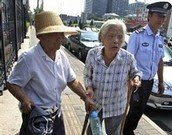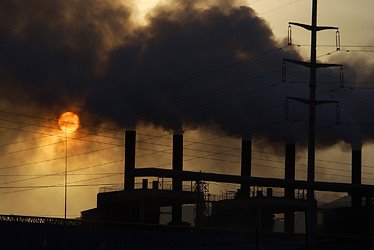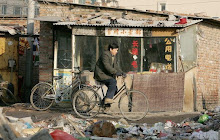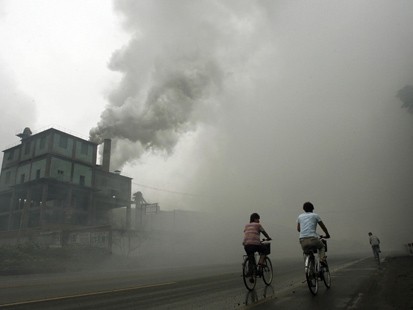 Without question, the biggest story of the Beijing Olympics was not the stellar athletic performance of Michael Phelps nor those of a legion of other great international competitors and champions, but the behavior of the CPC itself - particularly its manner of censorship and management of dissent, and any number of other falsehoods- from a lack of integrity with the sacred Opening ceremony, to empty seats and empty streets, to spurious birth dates for the pre-pubescent wunderbats, to just how ramped up China’s prisoner-operated sports factory is, and more. In many ways, these were the Potemkin Games, not the “greatest games ever”- just an effort by the CPC to continue to promote itself as the esse of China, and to show to the people of China, and the world, what a majestic country slash government it is.
Without question, the biggest story of the Beijing Olympics was not the stellar athletic performance of Michael Phelps nor those of a legion of other great international competitors and champions, but the behavior of the CPC itself - particularly its manner of censorship and management of dissent, and any number of other falsehoods- from a lack of integrity with the sacred Opening ceremony, to empty seats and empty streets, to spurious birth dates for the pre-pubescent wunderbats, to just how ramped up China’s prisoner-operated sports factory is, and more. In many ways, these were the Potemkin Games, not the “greatest games ever”- just an effort by the CPC to continue to promote itself as the esse of China, and to show to the people of China, and the world, what a majestic country slash government it is.Have no doubt; the real human contest of the 2008 games was played in the periphery of the sporting arenas. When the Chinese government announced in late July that there would be specially designated public protest zones around Beijing, and that all that was required in order to stage a public protest was to fill out a form at the local, friendly Public Security Bureau office, most of the international press and much of its audience, and more than a few Chinese activists, looked askance at these three parks: Purple Bamboo, Ritan, and World (The last a pirated piece of kitsch that Disney Corp. should litigate over). Countless more were stunned by the Party’s generous impulse. Many effused what a step forward this was for the Party, and the Party cynically went about its business. It never had any intention of these protest zones being utilized.
It was just a Chinese insult delivered via the Chinese way, in Chinese boxes: open one box to find another box, to find another box, and so on until the Closing ceremony, when the international community finally reached the last little box, and there inside was a little note that snidely said, “So sorry, but we are your Chinese moral superiors and can’t presume to help that. Now go, and leave us, we whom you shall never understand because you haven’t the refined mandarin sense to, and never again affect that you can enter our affairs. We do sincerely feel so badly for you for not being able to understand our ways. Sardonically yours, the eternal Chinese”
Anyone who ever thought that the Chinese would be straightforward and wholesome about this needs a serious education about the Chinese. Thankfully, they just got it. Pleasant, wasn’t it, finally getting down to that last box? It only took seven years to learn that what looked plausible was always implausible. The Chinese never had any intention of honoring the promises that brought them the Games. Dallying with the truth in such a lingering and meretricious manner is the way in which they deal with all inconvenient and unpleasant business. I’ve been spun out many times by the Chinese, and I’m afraid that it’s always done in ever-enclosing boxes- emptiness surrounding emptiness. However, one is always given ample time to figure that out so the Chinese don’t have to trouble themselves with telling you. If they have any leverage (and once they had the Games they had plenty), they expect that you’ll take it, and like them, not say anything about it. Superiority and servility are such a silent understanding. It’s kind of them. If you were in anyway upset by this duplicity and what it veiled, perhaps you’ll forgive me for dilating so on this very unpleasant matter.
It was most definitely naïve on the I.O.C’s part to think it would be any different. But that corrupt organization was a perfect, complicit fit for the Chinese, and I don’t actually think that they ever entertained any real illusions that it would be any different than it was, they just pretended they did. Their only concern, like all good upper bourgeoisies, is about money and the semblance of respectability, already having plenty of both.
If it looked too good to be true, my friend, of course, it was. Just ask those activists who showed up at the police station and were seized by the PSB orficials. Of the 77 applicants who took the government up on their offer to rock ‘n’ roll, (none of whom -as we now well know - were actually allowed to stage a protest), many are currently in detention or under house arrest, and at least one of them is said to be being held in a mental asylum. [1] Yet, it is two dear old grannies, together in their late 70’s - one blind in an eye, both on a cane - who the NYT reported about on 08-08-21* - that are the most astounding examples of victimization by a dystopic PRC. They share, however, the Gold medal for courageously putting the soft, white underbelly of the CPC beast to the knife of their dissent, and allowing us all to realize what a cowardly and absurd villain it really is.
These two feisty old dolls, Wang Xiuying and Wu Dianyuan, were actually given an extra judicial term of “re-education through labor” this week by the Beijing police, who simply handed down the sentence on their own without reference to the time consuming mechanism of a jury of one’s peers. (For the crime of public disorder disturbance sentences are always extra-judicial and earn an all-expense paid trip to the laogai). Way to go China! Jia you! Nothing says, “The people are the masters of the nation” like sending two female geriatrics, minus habeas corpus, to a laogai (re-education labor camp) for persisting in their seven-year determination to receive compensation for having their Beijing homes bulldozed! Clearly, the Party wanted to send a little message to anyone with a bit more gas in their tank that they might not really want to take on the state after all.
This cynical ruse to lure Chinese activists into the hands of the Public Security Bureau like big sucking fish is despicable and hearkens back to the same type of entrapment employed by the Party in ’56-57, during the Hundred Flowers campaign. The fallout of the summer of ’57 resulted in over 550,000 people being identified as "rightists" who were then subsequently humiliated, imprisoned, demoted or fired from their positions or sent to labor and re-education camps, where they were tortured or killed.[2] This type of rubbish, however, actually last occurred in the lead up to Tian’anmen during the Democracy Wall snare.
One wonders where this is going to lead. Though there is no whiff in the air of major foment, many in China are restive despite the stalwart ultra-nationalist “shit-youth” (fenqing; shit and angry are homophones in Chinese) and their revolting “la-la-la, we don’t see anything wrong, we don’t hear anything wrong, you don’t understand the Great and Mighty China, la-la-la” routine. The hyper-sensitive and reactionary fenqing whose free-floating anger is channeled by the government ala Orwell's Pigs and Dogs are loathsome, just visit any English China blog such as John Pomfret’s Washington Post blog, “Pomfret’s China” (that's flame central. He's infested with fenqing trolls) or Global Voices Online-China, and listen to them squall and mewl their inflammatory rhetoric, a lot of it racist, and all of it definitely ultra-nationalist. What delusion beyond delusion theirs is. They’re another subject, though, one that I’ll be getting to soon. Nonetheless, the other foot is going to fall in China now that the Games are over. The Party is not going to be able to use them any longer as a shield to justify its day to day abuses of power. Don't expect the fenqing to come to that dance, though. They are part of, or on the fringes of, the mere 5% of the population that possesses Party membership.
Yet, after these Games there may very well be a serious spike in “mass incidents” in China. The Ministry of Public Security says last year there were more than 58,000 mass incidents involving three million people (That's 160 per day. 51 people each, average! Even if you divide that by 3.5 to arrive at a commensurate ratio between America and China, you still get a head-shaking figure). The Ministry reported that this was an increase of almost 15% over the year before. Yet, as protests increase, Chinese police are trying different strategies to contain them, sometimes even making economic concessions to demonstrators, a move that in all likelihood will probably encourage more protests - the last thing the CPC wants. That’s why the 77 protests never occurred in the “designated protest zones”. They knew they’d have loud, howling hell on their hands if even one were to have occurred during the Olympics: it would have chain-reacted and quickly juggernauted out of control. I’d like to suggest that one of the different strategies that the PRC is trying out is the same old, tried and true strategy that has been used throughout Chinese history: encouraging dissent, and then exterminating it once the snakes in the grass slithered forth to get the bait. However, I think that those who did apply already reckoned the consequences, but simply and truly had nothing more to lose than what they’d already lost. 3 Perhaps some genuinely thought that the time and place were inviolable, and that the government orficials would play hands off, at least for a short while. It's impossible to say.
One thing is for certain. What the Ministry of Public Security terms "mass incidents" are strongly on the rise, and have been so since 1993. From 1998 to 2005, there has been, on average, a 25% increase in these incidents every year, and that they are said to being growing more and more violent. 4 (see graph at bottom of the page of this link) Arriving at 2005 there was a 360% compounding of them from the starting date which was a watershed year that saw a 60% increase in incidents from the prior year, '97. 1998 is the beginning of what I am terming "The Violent Wind" in contemporary China. This seminal year followed on the heels of the Communist Party's 15th Congress in late '97, which pressed for factory firings in the name of "efficiency", leaving many workers in the lurch.
It must also be pointed out that guaging statistics from the Ministry of Public Security is a somewhat tenuous endeavor. 5 For one, it almost goes without saying that there is a certain degree of under-reporting on the part of the government. How much, of course, is unacertainable. Secondly, there is apparently some bleeding together of "mass incidents" and "cases of public disorder disturbances", the latter of which can be perpetrated by a single individual and need not be part of a gathering. Also, there are those occassions where a community gathers spontaneously and without permission to actually applaud the police for a job well-done, as in the example cited here. 6 (2nd para). Nonetheless, these incidents and cases don't bode well for the government and never have.
So, the Collapse of China Theory. I can hear you asking, "does Ant Farm subscribe to and promote it?" That's a darn good question. The verdict is still out. All the same, given these government produced figures coupled with an environment that is rapidly deteriorating, and which could lead to what I have termed "ecological barbarism" anytime in next 2 to 5 years, it's not out of the question, particularly in light of other considerations such as overpopulation and the massive array of problems in engenders, provincial fragmentation due to economic and historic cultural divisions, a west-east economic dichotomy, etc. Yeah, it could definitely happen given the proper catalyst and could only be a matter of time, if this world has any time left.
What I see glowing on the horizon for this world, and not only China, isn't especially a pleasant picture. The next two years will be absolutely critical. How quickly the West can green its economies, and crucially, how quickly China and Asia can do the same, will determine everything. How forgiving a mistress Mother Nature is the major question. Will she allow us a bit more time to remedy our ways before she cracks? The Ant doesn't know, only prays so for he loves Mother Earth. I am afraid most of the healing, if it occurs, will have to be spiritual, though. Not merely physical and material.
I am not of the opinion that the Chinese's little charade this last two weeks or so has done anything to improve the chances of the just aforementioned. I believe that despite many wonderful and good intentions of the Chinese people, the overarching duplicity and bad faith of the PRC/CPC significantly undermined those things, and ultimately, you can't separate any government from its people.
I sense that, for China, what is in its near future is this: it is going to find itself being pulled away from, internationally. I think that around the world that people from Argentina to Zimbabwe had an a very good opportunity to look close at the Chinese, into their soul, and very probably very many let out a big, collective "ewww". Indeed, somethings are very cute and gentle, but there is something else there that is also extremely unappealing, if not nearly subhuman. I've spent a good deal of time with the Chinese. Finding a middle way to arrive at a higher ground is easier said than done. But as Zen Master Pogo once said, "we have seen the enemy, and he is us."
Nonetheless, after the betrayal of promises regarding human rights, democracy, and freedom of information, which are very important to the West, if only because we say so, and everyone agrees, though themselves are ne'er do wells, that it is going to be a long time, beginning now, before the I.O.C. or any international body grants the PRC Jack's shirt. The upcoming 2010 International Expo in Shanghai will be, I predict, their last little frolic on the world stage.
As for the corrupt, self-serving, self-aggrandizing, and pussy-llanimous I.O.C, it took a huge moral bruising at the hands of the PRC/CPC, and any notion that Shanghai might be the next city in China to host the games is more than a stretch. As they say in Little Italy, "feggeddaboutit", meaning this time, don't even consider it a possibility. Yet, the moral of the story for the I.O.C. is this: as long as its ulteriority is money and the semblance of respectibility, and all the nice bourgeois things that come with them, but not a real integrity with the spiritual principles of the Games, they are going to continue to reflect the defects of the Western soul in a very unappetizing way. But, in their defense, China was definitely standing in a place where it had to be entrusted with the sacred Games. It had to be given a chance to host them. It had earned that much. I only know that I wouldn't have voted for them.
Coming from my bias against China, I have a strong sense that their betrayal is actually going to be a serendipitous affair. I feel very strongly that the West, particularly America, needs to distance itself from China. I think that that is going to be a whole lot easier to do now, and will begin to happen somewhat organically and automatically. America needs to learn that it doesn't need China, it needs America. Not a false nationalism though, but its real soul. It needs to recapture that so badly, and its attachments to China have been hindering that. As for China, maybe it needs to be more isolated. There're things it definitely needs to work on. Both countries have a lot of work to do on themselves. Some distance would be ameliorative.













